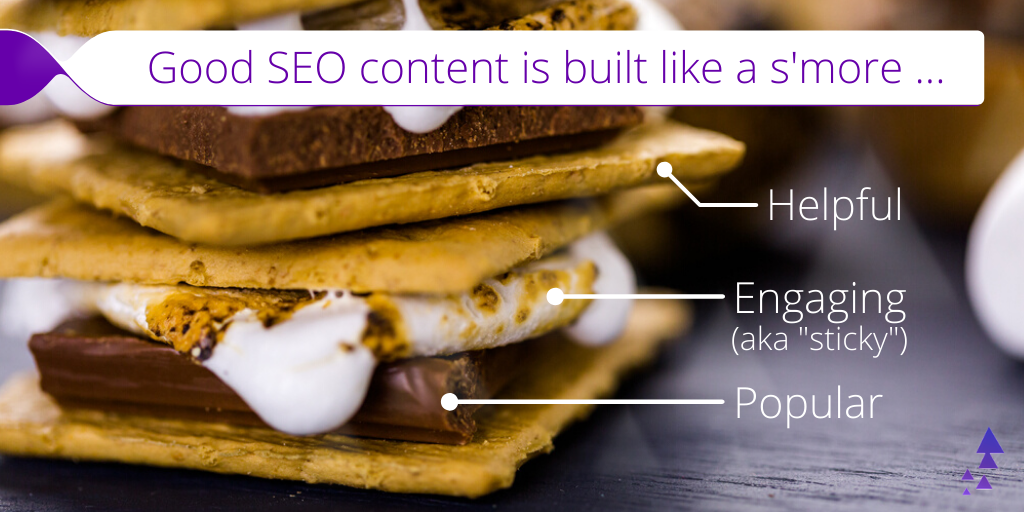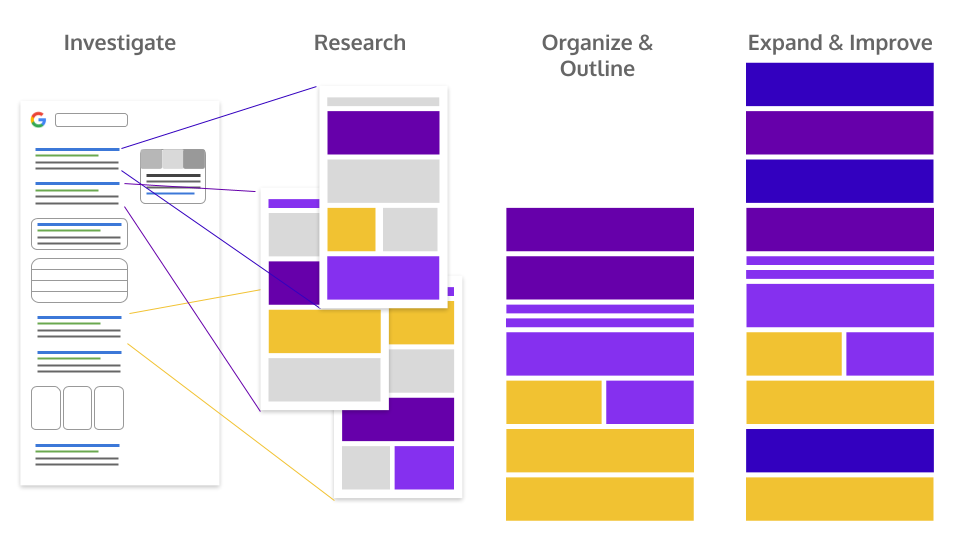SEO is a Competition, and “Optimizing” Alone Doesn’t Win!
In the past, SEO was mostly about who could optimize content and pages for all sorts of technical factors: putting target keywords in all the right places, creating internal links, maintaining an authoritative domain, building inbound links, and disavowing any inbound links that got flagged. And there was always the hope that you’d discover some kind of SEO trick that no one else knew about.
We’d compete through these mechanisms to win a better SERP ranking. Spammy backlinks and keyword stuffed image alt text didn’t create value for real people, but they were the best signals Google could measure at the time.

Today, thanks to machine learning (ML) and artificial intelligence (AI) infused algorithms, all of these ranking factors mean far less than they did years ago. Even backlinks—considered the biggest ranking factor for many years in a row—are less impactful on actual rankings.
From Optimization Techniques to Amazing Content: The New SEO
So, what does matter?
The metrics that we don’t see, and to which we have no access, are what matter to Google now, and many of them fall under the umbrella of user experience:
- How many searches did the user perform?
- How many times did the user re-word or edit a search?
- How much did the user engage with a click?
- How helpful is the content to users?
- How long did users spend reading the content?
- Where did the user go after exiting the website?
There may be dozens or even hundreds more factors that make up what Google considers “user experience.”
(And, there’s no proof of this, but I suspect there’s probably a metric that considers which rankings and organic results actually lead to more ad clicks. After all, Google’s business model is based on paid clicks, so it makes sense to assume there is something in the organic algorithm that is concerned about Google’s own revenue.)
There are metrics today into which we have no insight at all. And the most important ranking factors of years ago have little to no impact today.
In a very real sense, we’re working blind. Google has layers upon layers of ML/AI-based algorithms that are optimizing each other, over and over again, for vast amounts of data. We used to believe there were about 200 ranking factors. Today, there are probably hundreds or thousands, and we have no information about most of them.
We’re in the dark except for one thing: rankings.
So, How Do You Win SEO Today?
Any time a user performs a search, there are hundreds of URLs competing for that click. We don’t know precisely how Google determines winners, but we know the URLs in those top three organic positions are doing something right. We know users are engaging and preferring that content.
The only way to win today is to look at who is winning. If this is the content that Google knows is most helpful to users—and helpful content is the foundation of its revenue— what do you have to do?

You have to study those results, figure out what the winners are doing and how they craft their content, and then you have to beat them by creating even better content.
Here are some basic steps you can take:
- Take a look at multiple SERPs, for queries that produce similar results, and identify who is winning in the organic space for that topic/conversation.
- Study what they’re doing well. Is the content long or short? Informative or sales? Are there images? Tables? Video? Graphs? Is it timely? Using lots of outbound links? What are some common subtopics?
- Go above and beyond. Include your brand’s unique insights and value. Combine subtopics from the top three to five winners into one complete resource. You may also be able to improve on the UX, images, etc.

Creating exceptionally helpful content is the most important step to generating organic traffic and beating your competitors in organic search. It’s also the best way to earn authoritative, natural backlinks, which are still markers of high-quality content.
You should still be mindful of the technical aspects of SEO, but technical SEO factors are no longer the primary cause of high or low rankings and organic traffic.
Dropping Ranks No Longer Means Something is Broken
A few years ago, if a website saw a big drop in organic search traffic—whether it was an immediate drop or a gradual decline over time—an SEO professional or developer would assume that something broke. Or maybe there was an algorithm update, and now we need to adjust the website in order to get ahead.
A minimum competency in technical SEO is important, particularly for large websites with hundreds or thousands of pages. But Profound Strategy has investigated many gradual declines and sudden drops in organic traffic and—most of the time—nothing on the website is the cause of the decline. The truth is that others are winning by producing better, more helpful, content.
Win in Organic Search by Creating the Most Helpful Content
In many ways, it’s a relief to know that we don’t have to focus on an endless list of on-page and technical “to-dos” on a website that are not relevant for users. What users want—and what Google wants to provide—is helpful content.
Companies that are successful in the SERPs achieve baseline proficiency in technical SEO, then focus on creating helpful content. Study the winners in your industry, those companies that Google rewards with top positions and lots of clicks. What are they doing that you’re not doing?
Then go do it better.
What's Next?
Profound Strategy is on a mission to help growth-minded marketers turn SEO back into a source of predictable, reliable, scalable business results.
Start winning in organic search and turn SEO into your most efficient marketing channel. Subscribe to updates and join the 6,000+ marketing executives and founders that are changing the way they do SEO:
And dig deeper with some of our best content, such as The CMO’s Guide to Modern SEO, Technical SEO: A Decision Maker’s Guide, and A Modern Framework for SEO Work that Matters.




